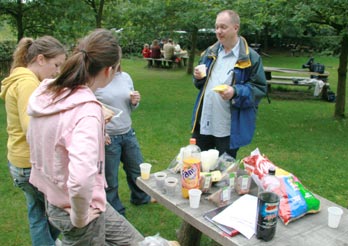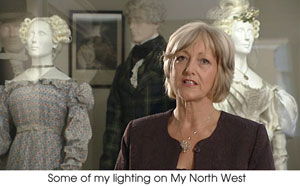The crystal ball for 2006.... and how it turned
out
More video production work, possibly with Peter Baker, but there's also
another production with which I could be much more closely involved. All I can
say now is that it's a current affairs documentary, quite political and
potentially controversial, but very low budget. As such, I may be involved with
directing, camera-work, sound, editing, graphics and who knows what, but at
least I'll have some very direct input and influence over the way it looks.
Half right. I did lots of work for Peter Baker but the other project hasn't
happened yet. We did do some work on it earlier in the year but then it all
rather fell apart over disagreements about how it should proceed. Meanwhile
Peter Baker had two broadcast commissions and has been my major customer of the
year. The first was "Prank Patrol", which is part of the BBC's TMI Saturday
morning show, on which I helps shoot the title sequence, and the second was
another series of My North West on which I'd worked last year. You can see a
little sample at
www.zenvideo.co.uk/cav/HorseDriving.wmv (if it's still there)
 This time on MNW I did most of the location sound recording, the first time
I've returned to such work in about ten years. Apart from the early starts it
was generally very enjoyable, and I found the time flew by - more so than when I
was at Granada. Lots of things were different, not least the lack of training
and experience amongst some of the other crew, but if I was asked to name just
one it would be this. No-one has any navigation or map reading skills any more.
The "Sat Nav" generation have no idea where anywhere is in relation to anywhere
else! Of course when I started out there was no Sat Nav, you just looked at
maps, looked at where you were going when travelling and built up your own
mental picture. So thank you Granada. I'm pleased to say that I can still drive
around the North West and get within about a mile or less of where I'm going
before I have to look at a map to check the exact location. This time on MNW I did most of the location sound recording, the first time
I've returned to such work in about ten years. Apart from the early starts it
was generally very enjoyable, and I found the time flew by - more so than when I
was at Granada. Lots of things were different, not least the lack of training
and experience amongst some of the other crew, but if I was asked to name just
one it would be this. No-one has any navigation or map reading skills any more.
The "Sat Nav" generation have no idea where anywhere is in relation to anywhere
else! Of course when I started out there was no Sat Nav, you just looked at
maps, looked at where you were going when travelling and built up your own
mental picture. So thank you Granada. I'm pleased to say that I can still drive
around the North West and get within about a mile or less of where I'm going
before I have to look at a map to check the exact location.
The
location work took place from the end of July to the beginning of October,
typically a few days each week, and then I started on the "edit mastering". As I
write this at the end of the year, six are done but I'm still finishing the
final two, hopefully within the next week. As before, it had been edited and
approved for content by the executive producer at Granada before it came to me.
However, in some ways it was still in a very "rough and ready" form. It was the
editor's first broadcast job after leaving college, which should tell you
something. Apart from the main sound track (interviews, presenter to camera and
voice-overs), much of the sound from other shots was not present, and had to be
found and edited in. Many of the edits needed to be adjusted too. For example,
many sound edits were so tight that someone would just be finishing the last
word from an interview when the next bit of voiceover would come crashing in so
hard it felt like a slap in the face. And yet in other parts there would be
suddenly be ten seconds or more of nothing in particular which was crying out
for a bit of music or something to cover it.
 All I was supposed to be doing was picture grading, audio dubbing, and
transferring the final programme to DigiBeta tape ready for transmission. There
was still plenty of grading to be done, not least because Peter thought it would
save time on the shoots to use two cameras. Unfortunately not the same type of
cameras. So not only did picture levels need tweaking when necessary to correct
for poor exposure settings, but often the colour balance needed adjusting on all
the shots from one camera to match it to the other. All I was supposed to be doing was picture grading, audio dubbing, and
transferring the final programme to DigiBeta tape ready for transmission. There
was still plenty of grading to be done, not least because Peter thought it would
save time on the shoots to use two cameras. Unfortunately not the same type of
cameras. So not only did picture levels need tweaking when necessary to correct
for poor exposure settings, but often the colour balance needed adjusting on all
the shots from one camera to match it to the other.
Audio-wise, one of the reasons for having a sound recordist on location was
to try to make the audio post-production easier, and to make sure we had
location sound on shots where sometimes last year there had been none. It
partially worked. There has been less work to do in the "audio dub" stage where
you're adjusting levels to keep everything within the prescribed dynamic range.
However, one sound recordist can't service two roving cameras, so much of the
second-camera sound was just as bad as it was with last year's single camera.
And this year's editor clearly wasn't "into" sound or track-laying, so although
usable sound was available, it often hadn't been used in the edit. Worse still,
bits of sound that I'd said were NG (no good), at the time of shooting, had been
used.
At this stage, if you're still reading, you may wonder what satisfaction
there was to be had from working on this apparent shambles of a show. It's a bit
like playing Sudoku, trying to find a permutation of the available resources
(pictures & sound) that can go together into a sequence that works. Frustrating,
because it shouldn't be so difficult. You should be spoilt for choice during
editing, spending your time deciding which is the best of the possible options,
not being forced to use the ONLY option and struggling to find it. However, the
flip side is the feeling of elation when you actually do! Unfortunately,
no-one watching is going to know what a struggle it was. If it works, you just
watch it. I guess it's all down to proving something to myself, gaining more
experience and hoping I'll find an opportunity to work on something more
meaningful in the future.
Sometime around Springtime (NHS waiting lists permitting) - two separate
hernia ops at Hope Hospital's day surgery unit. When I worked at Granada, we
always joked about the larger equipment flight cases as "hernia boxes", but
maybe it was true.
Both hernia ops went ahead, and appear to be successful - for now. However,
due to changing locums I had two different surgeons and two different surgical
techniques. The second, and by far the better of the two ops from my
perspective, was by a New Zealand surgeon who used laparoscopic techniques (keyhole
surgery). Not only does this give a better type of repair (inside rather
than outside the muscle wall) and heal far faster with less discomfort, but had
it been available from the outset it would have been possible to do both repairs
during the one operation! On both occasions the NHS Hope Hospital staff were
excellent and apart from suffering from low blood pressure immediately after the
op (and needing a saline drip before I could stand up) it really was pretty
trouble free. So after more or less 50 years without hospital treatment, I've
now had three ops requiring a full anaesthetic in the last three years, and
beginning to feel a bit of an old hand at it, which is probably just as well as
I'm sure it won't be my last visit as old age approaches.
September - if all goes well, another trip to Amsterdam for the IBC show.
Thought about going again in 2005 but left it too late to book accommodation.
Flights were still available, cheaper and with more choice than the previous
year, but nothing at all on the hotel front unless you were prepared to be 20-30
miles away. Part of the pleasure of being there the previous year was staying in
the centre of Amsterdam, so hopefully I'll remember to book early enough this
year. No trips abroad this year, in fact no major holidays at all.
What with the hernia ops, Thelma & Lewis's hospitalisation and deaths, and
working on My North West, that's pretty much accounted for the year. We had the
odd day away in the summer for a couple of the weddings, which was nice, but
we're certainly due a proper holiday at some point soon. |